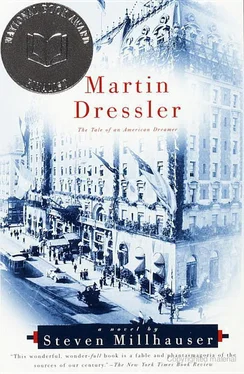In the warm-cool evenings he again walked out with the Vernon women. He would stroll along the lamplit sidewalks with Margaret Vernon, a few steps in front of Emmeline and Caroline, and at the street crossing he would continue with Emmeline, behind Margaret and Caroline, and at the next crossing he would continue with Margaret, behind Emmeline and Caroline. One night in the park he was surprised to find himself walking beside Caroline, through spaces of lamplight and spaces of dark. A sharp moist smell of green was in the air, heavy and bitter, mixed with the sweet decay of brown oak leaves. In the glare of the lamps her cape was very black, her coat very red, her hair very yellow. She looked like a new painting, all wet and shiny, but already she was fading into the darkness between lamps. Something crackled in the black trees. From beyond a turn in the path a stick struck the ground at regular intervals. “Do you know what I was thinking,” Martin heard himself say, startled by the sound of his voice, as if he had reached out and touched her mouth. Somewhere a man and woman laughed together and suddenly stopped. Around the bend came an old man in a silk hat, striking the ground with his stick, striking the ground with his stick.
All night long the sharp stick struck the ground as Martin lay in a restless half-sleep, and now the old man was thrusting his pointed walking stick into Caroline’s foot: blood ran from her shoe. Martin rose in the dark, washed in cold water, put on his suit, and went down to the lobby. It was half past three. The lobby was empty except for the night clerk. Martin sat in a lobby chair with a view of the elevator corridor and waited for the graying of the dark lobby windows. She was closed in dream, a princess in a tower, scarcely a flesh-and-blood woman at all. Did he then desire her not for herself but for all that was unawakened in her, all that had not yet come into being? His mother had read him that story: at the Prince’s kiss, Dornröschen opened her eyes. Then the fire leaped in the fireplace, the horses in the stable stirred, the pigeons on the roof took their heads from under their wings. And a mournful desire moved in him, for the princess in her chamber, as he imagined her young body stirring, the ribs moving under the skin, the wrists turning, the eyes, dark with dream, slowly opening after their hundred years’ sleep.
At five minutes before six, Emmeline appeared around the corner of the elevator corridor and gave a start. She was wearing a coat and hat and carried an umbrella. She came swiftly toward him but Martin did not rise.
“Tell her—” he said. “Tell her—” His eyes hurt, his eyelids trembled, there was a muffled buzzing deep in his brain.
“You don’t look well,” Emmeline said, bending toward him with a frown.
“Tell her,” he said. “Tell her I—” In his throbbing ears his voice sounded faint and thin, and he was reminded of a child he had once seen on a calendar, kneeling and looking up with pleading moist dark eyes. He tried to recall where he had seen that calendar, and in the gray dawn of the lobby, where elevator grilles were already rattling open, his eyes burned, his nose stung, a bell rang.
TWO NIGHTS LATER WHEN CAROLINE ROSE from her chair in the parlor and Margaret rose after her, Emmeline said that she had some business to discuss with Martin and would be along in just a few minutes.
Her mother looked at her doubtfully. “Don’t be too long, dear. You know you need your rest, what with this job of yours that makes you get up in the middle of the night like a — like a rooster.”
“I’ll be along directly,” Emmeline said.
She and Martin sat silently across from each other as they watched Caroline and Margaret walk from the parlor. They remained silent as they listened to the sound of the closing elevator door.
Martin leaned forward. “You’ve spoken to her?”
“I have.”
“And she’s — receptive?”
“She’s not unreceptive. With Caroline it isn’t always possible to be definite. So much depends on how she’s slept the night before.”
“Still, you feel—”
“I do.”
Martin reached into the pocket of his coat and removed a small blue velvet box, which he placed on the table. He watched Emmeline look at the box.
“Here,” Martin said. “Let me show you.”
He bent over and quickly pulled up the lid, which was attached to the box by a hinge on one side. Emmeline leaned forward, resting one palm on the arm of her chair.
“Oh, she’ll like that,” Emmeline said, and leaned back.
“Good. The real question is whether she’ll accept it. You say it all depends on how well she sleeps?”
“Not entirely, of course. I was exaggerating. Caroline does what she wants to: always. But there are worse times and better times at which to speak to her.”
“It’s asking a great deal of you, I know.”
“I can promise only one thing: to find the most propitious time.”
“But that one thing is everything. I can’t thank you enough. But would you mind”—he bent over the box—“for just a moment? I’d like to see—”
“If it’s absolutely necessary.”
“Just for one half second. Here. Let me do it for you.”
Martin rose quickly from his chair and bent over Emmeline, who held out her hand stiffly.
Martin straightened up and walked behind her chair, where he stood looking down at her hand. The hand turned slightly in one direction, then in the other. On the table the inside of the blue velvet box was violent black. The fingers contracted into a loose fist and slowly spread out again.
Martin began walking around the circle of armchairs to his seat, watching Emmeline’s hand as he went.
As he sank back into his chair he said, “I can’t begin to tell you—”
“Don’t,” Emmeline said.
IN THE WARM MAY EVENINGS THE STROLLS continued, but now Martin always walked beside Caroline, a few steps in front of Margaret and Emmeline. They walked past the sudden sharp scents of window boxes heavy with purple and yellow flowers, under branches of leaves green-glowing and translucent in the light of streetlamps, into the darkening Park. They had never spoken directly of their engagement, although the night after his talk with Emmeline he had walked into the lamplit parlor where the three women were sitting about the little table, and drawing closer he had seen something flash up from the back of Caroline’s hand outspread on the dark-red gold-flowered chairarm. Margaret Vernon, glancing quickly from Emmeline to Caroline, had congratulated him with a kind of muted effusiveness, while Caroline, raising her eyelids abruptly, had looked at him with large dark eyes that immediately vanished under lowered lashes. After that she walked by his side in the warm evenings, holding herself very straight. Sometimes he would bend his head slightly to say something meant for her alone, such as “These spring nights are the best time of year, don’t you think, Caroline?” and the sound of her name, issuing from his mouth, seemed to him so intimate, so much like a hand stroking her face, that he could scarcely attend to her murmured reply, which in any case was so soft that he could barely hear it, a reply that sounded like “Oh, that’s all right,” as if she hadn’t quite heard him correctly. The constraint between them, the sharp edge of formality that thrust at him from every movement of Caroline’s body, seemed quite proper to Martin, since easy-going camaraderie was the note of his friendship with Emmeline — a friendship that flourished precisely to the extent that the sexual wasn’t in question. His ambiguous friendship with Marie Haskova was another matter, for his sense of ease with her, his pleasure in watching her, his playfulness, his laughter, all this was made possible by the existence of something unsettled and secretive between them, which lent to their casual meetings an air of intimacy, of adventure. Therefore the slight awkwardness that he felt in the presence of Caroline, his sometimes exasperated sense of a resistance, an inviolable propriety, struck Martin as entirely correct, since in the absence of such constraints there would have been nothing for her to be except a friend or a mistress. Had she flirted with him, had she invited secret, forbidden caresses, she would have seemed commonplace to him, a mere step away from Gerda the Swede. It was as if her perplexing, irritating coolness, her difficulty, were a sign of her high value.
Читать дальше












